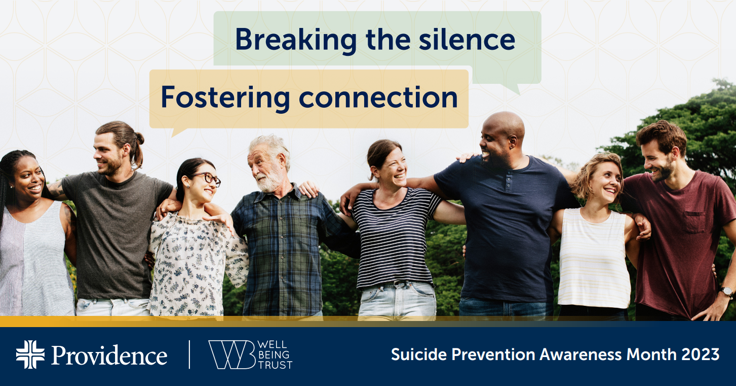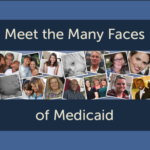National Suicide Prevention Month: Helping people feel less alone in their struggles and providing resources and support to save more lives
National Suicide Prevention Month is a critical time to provide support for and raise awareness about the growing mental health crisis in America. At Providence’s Well Being Trust, we’re committed to advancing the mental well-being of all people. This month, we’re focusing our efforts on “Breaking the Silence” around suicide—helping people feel less alone in their struggles and providing resources in hopes to save more lives.
Our country experienced a record high number of deaths by suicide in 2022, according to preliminary data from the Centers for Disease Control and Prevention, in an analysis from the Kaiser Family Foundation. The greatest increase was found among adults ages 65 and older—rising 8.1% since 2021. It’s a solemn reminder that suicide risks can occur at any age, and we must be vigilant about checking in on every member of our community — from our kids to our grandparents. Suicide rates among children, teens and young adults ages 18-34 decreased by 8.4% during the same period, and while there is still a mental health crisis among young people, there is great hope in this progress. This shows that when we come together across sectors to make a concerted effort to support mental well-being, it can make a difference.
Reducing Stigma
Unfortunately, despite some progress, mental health stigma still plays a significant role in rising suicide rates, and is recognized by the CDC as a major risk factor for suicide. Stigma can be both internal, in the form of shame or internalized negative beliefs about mental health struggles, or external in the form of judgment or lack of support from those around us. Often, stigma causes people to hide their struggles and avoid seeking treatment. We’ve made progress in normalizing discussions on mental health in our society, but there’s still a long way to go.

- Work2BeWell Anti-Stigma Resources
- Work2BeWell + PsychHub Stigma Reduction Resource
- National Alliance for Mental Illness StigmaFree Campaign
Know the Warning Signs 
- Connect: Ask specific, direct and open-ended questions, such as, “I’ve noticed you’ve been distant lately, are you okay?” and “Are you having thoughts of suicide?”
- Partner: Let them know they’re not alone. Validate your loved one’s concerns and be an active listener, without trying to “fix” the problem. Direct them to trusted resources.
- Respond: Continue to follow-up with your loved one, reach out to a hotline for support and contact a trusted adult, counselor or medical provider.
Screen for Mental Health like Physical Health
During the pandemic, Providence launched the My Mental Health Matters program in partnership with the American Foundation for Suicide Prevention. The program included an online mental health “check-up” tool, where caregivers can access a confidential assessment to identify areas they may be struggling and get connected to appropriate care. Providence’s My Mental Health Matters program recently was named a winner in Ragan’s Workplace Wellness Awards in the Mental Health Initiatives category.
We also offered ECPR training for caregivers, which helped them learn about suicide warning signs, dispel myths, and gain the tools to have genuine conversations about suicide with their teams and communities. In 2022, nearly 40,000 caregivers took the training, empowering them to make a difference in their communities.
Seeking Support
There are many free resources for people from all backgrounds to access help if they’re struggling. From teens and the LGBTQ+ community to veterans and those from communities of color, culturally-competent help is just a few clicks, a text message, or a phone call away. Explore a few free resources below:
- 988 – The National Suicide and Crisis Lifeline – Resources
- Youth and Young Adult Resources
- Resources for Communities of Color
- LGTBQIA+ Resources
- Military and Veteran Resources
- National Maternal Mental Health Hotline
- View additional resources
Fostering Connection 






